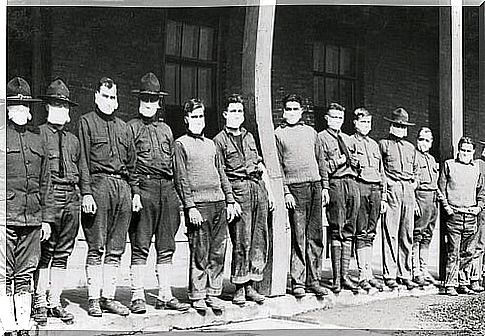The Great Epidemics Of History

The struggle between humans and microorganisms is as old as history itself. Entire civilizations, as probably happened with the Mayans, were extinguished by these invisible enemies. However, the great epidemics of history have also left great lessons. Among them, this human intelligence which was able to win extraordinary battles.
There are several major epidemics in history that have left a lot of pain behind, but also important knowledge. We also reviewed at least five pandemics, which differ from epidemics in their magnitude. Although the epidemic only occurs locally, the pandemic is global in scope.
In the five deadliest pandemics, humans have won. Thanks to intelligence and its most successful product: science.
Yesterday and today, thousands of people around the world are working every day to find their way back to health. The great epidemics of history have their victims, but also their heroes ; great sorrows, but also glorious moments.

Smallpox, the deadliest epidemic
Smallpox is the most violent and deadly disease in history to date. Likewise, it is one of only two diseases that humans have completely eradicated. The famous proverb says “To great evils, great remedies”. This is what happened with this disease, which claimed the lives of 300 million people.
In Europe, it devastated entire cities in the 18th century. In America, it caused a demographic collapse during the Conquest. For example, it is believed that at least 13 million Incas were killed by the plague.
Until the 20th century, virtually every year there was a smallpox epidemic in one part of the world, and during that same period it killed at least two million lives.
The virus has been successfully defeated through science and cooperation. In the midst of the Cold War, then Soviet Union Deputy Minister Víktor Zhdánov offered to wage a global struggle. He had his initiative to provide vaccines to everyone on the planet approved. In 1980, the disease was officially declared eradicated from the world.
The Spanish flu, another of the great epidemics in history
Another of the great epidemics in history took place in 1918: the Spanish flu. It was especially scary as she attacked people of all ages and even dogs and cats. It is considered the most devastating epidemic of all that has occurred, as it killed between 20 and 40 million people in a single year.
The virus is said to have first attacked in March 1918 in Kansas, United States. He came to Europe from American troops during World War I. To date, the virus had already undergone one or two mutations that made it extremely aggressive and deadly.
This flu, very similar to that of COVID-19, caused infections in waves. The second was the deadliest and, as it is today, overwhelmed the capacity of the health care system.
The cure for this disease has never been found, but some treatments are relatively effective. The virus gradually disappeared, the survivors having been immunized to it.

The Ebola epidemic
Although Ebola did not result in a pandemic, it is one of the deadliest viruses in history. The death rate is between 41 and 89%. Likewise, the disease kills very quickly, so in this case the problem was not so much contagion as lethality.
Ebola virus disease has mainly affected countries on the African continent, although it has also reached Spain and the United States. One of the most striking aspects of this disease is the severe symptoms it generates, including internal bleeding in the mucous membrane and puncture areas.
At the moment, there is no treatment or vaccine for this disease. However, several investigations are progressing in this regard and since 2015, a vaccine has been available in the experimental phase. It is estimated to be 100% effective.
Like other diseases caused by viruses, this one also results from contact with animals. Today, and especially with the onset of COVID-19, the idea that it is necessary to radically rethink our relationship with the rest of nature has begun to take hold.










